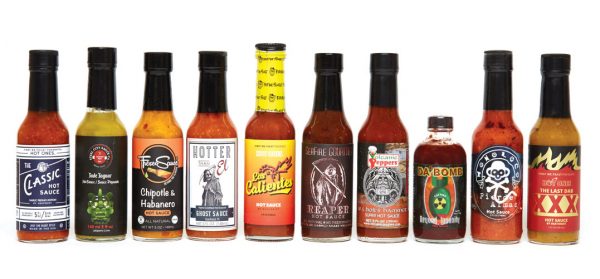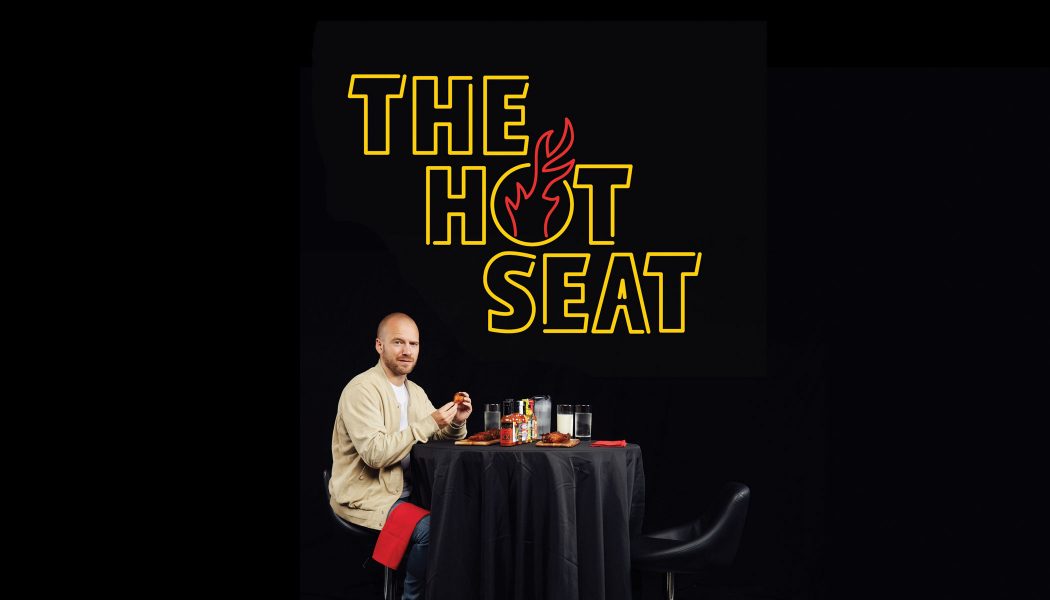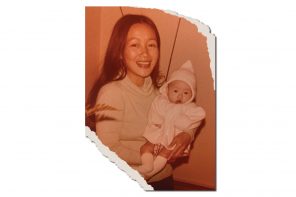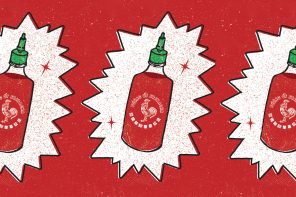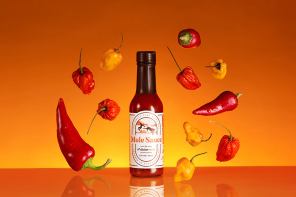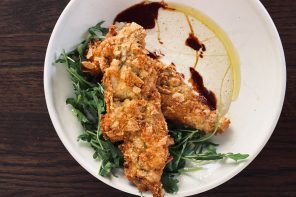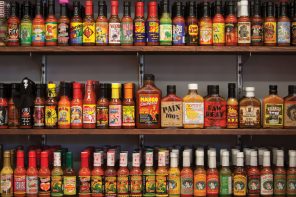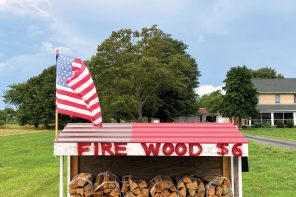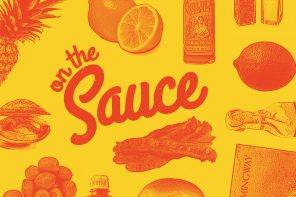The tables are turned when Hot Ones host Sean Evans answers Whalebone Magazine’s questions about hosting a chicken wing talk show.
Photos courtesy Complex Networks
To paraphrase the legendary Chicago White Sox outfielder Minnie Miñoso, hot sauce has been very, very good to Sean Evans.
The show started as, in Sean’s words, “a dumb idea,” and evolved into a cultural phenomenon in its 12th season on First We Feast, Complex Networks’ food brand, that has been extensively memed (notably Idris Elba cry-coughing, which granted, is a highly adaptable reaction), spawned the “Hot Ones: The Game Show” spin-off on truTV, and garnered millions upon millions of YouTube views.
The premise was simple. Guests come on the show to be interviewed by Sean, who at that time was working as a copywriter, with the hook that they both would be eating chicken wings doused in hot sauce. It didn’t set the world on fire at first.
“We didn’t think that the show would be anything,” says Sean. The idea seemed to have little appeal outside a small but devoted following. “We were just trying something out and actually the show was not popular for a long time. We used to joke internally about how many scorching-hot chicken wings I’m eating for nothing. Nobody was watching. Nobody cared. I had another full-time job. I was just doing Hot Ones on the side because I believed in it. Then it broke containment at some point and it feels like it’s been on this wild sort of runaway train ride ever since.”
The likes of Will Ferrell, Aubrey Plaza, Shaq, Charlize Theron, Gordon Ramsay, Pete Davidson, Paul Rudd, Coolio, Natalie Portman, Shia LaBeouf, Scarlett Johansson, John Mayer, Brie Larson, Kevin Hart, Action Bronson, Jeff Goldblum, Justin Timberlake, Margot Robbie and Neil deGrasse Tyson have all accepted the challenge to come on camera and be interviewed while making their way through ten increasingly burning hot sauces.
As host, Sean Evans eats every hot sauce along with his guest, and by now he’s gotten pretty good at it. He shares a little of what he’s learned along the way. We did not make him eat anything spicy.
Your guests have had some memorable reactions over the years. Have you ever killed anyone by giving them hot sauce that you know of?
Sean: Not that I know of. I don’t think so. And I for one have eaten Carolina Reapers before and stuff so I’m sure we’ve put some people on the doorstep but I don’t think… so far I think our hands are clean.
You’ve eaten a couple of Carolina Reapers yourself. So if you don’t fear the Reaper, what do you fear?
Sean: I fear the Reaper. I’ll tell you that. I fear the Reaper and I have a healthy respect for hot sauce, having had sampled so many and having done some extreme things with peppers and stuff where it’s not like I’ve done 200 episodes and done all these things that I’m like, “Ah! I’m the king of spicy. I can eat anything.” I know from the smell. I have almost a Pavlovian response to Carolina Reapers. I smell it, my body starts rejecting it before I’ve even tasted anything even if it’s just in the sauce. So I fear the Reaper. I fear the habanero. I fear the chocolate habanero. I fear many things in the spice world.
I smell it, my body starts rejecting it before I’ve even tasted anything.
You have an amazing poker face. You get through the hottest sauces and you keep your composure and the guests don’t always. Well rarely. Is that part of the secret sauce that makes the show work so well? Are people’s guards down and you can get such human responses from them?
Sean: We try our best to create thoughtful career-spanning interviews. Hopefully, we keep the guests engaged like they’re actually enjoying the interview part of the show. So they’ll put up with eating a wing covered with Blair’s Mega Death Sauce with Liquid Rage. We try to keep them engaged by meeting them halfway, because to be fair to our guests we’re asking a lot of them. A lot of these people who come on the show, the hottest thing they’ve ever tasted in their life, they’re eating it with four cameras in their face and being on a show, being a hostage on a show. So I think that’s part of it but it does have a humanizing disarming effect. Celebrity is this thing that by definition is an unobtainable lifestyle, very aspirational, but hot sauces knock people off of that pedestal.
I think that that’s why people enjoy watching the show because they get a true sense of what it would be like to have a beer with that person. Everybody’s always trying to make that show. I think we kind of accidentally did. And then there is something about being distracted by the hot sauce to where you have no choice but to just let your guard down and be human, because otherwise either you panic or you shut down. So I think people eat these wings, they have a crazy reaction, but the premise of the show is so absurd that you just kind of laugh and keep going.

Who has had the absolute worst reaction?
Sean: The episode that we just put out with Eric Andre, it was the at-home edition so people are just pouring sauces on the wings themselves, and by wing eight he was carrying around his camera all over his house and dry heaving in the sink and spitting milk out and drinking milk of magnesia and passing out on his couch.
That was a rough one, but all time it’s probably the episode with Coolio. He just poured an entire bottle of hot sauce on the last wing and tried to poker face through it. And he was face down in our green room for a while. I think we probably left to go home and he was still there.
You introduce each show by saying “it’s the show with hot questions and even hotter wings.” Do the questions get harder as the sauces get hotter?
Sean: No. At first, we thought that that would be a good idea that the questions get hotter or whatever but ultimately what we found is that the hotter the sauces get, you’ll get less complete, thought out answers because people are just trying to survive it. So what we’ve tried to do now is kind of front-load the interview with the topics that we think people will probably be most interested in hearing thoughtful, complete responses to. And then if we have some sort of game or some sort of thing, we kind of like take the pressure off the gas in the later rounds because they’re going to be dealing with so much. We’ll kind of throw those things towards the end just in case they’re completely unable to speak, we’ll still have something there.
Who has said “no” to Hot Ones that you really wish would come on the show?
Sean: There haven’t been too many people that have been like, “No, I’ll never do it.” I don’t know if that’s ever happened. A lot of times what happens is people can’t do it for whatever reason or they’re not interested at one time. And then we come back and get them later on. That’s kind of what happens all the time, we’ll chase somebody in season three and then end up getting them in season seven or something. So I think with Hot Ones, it’s like if you know the show, then it’s an easier sell, but on paper, it’s such a difficult ask. Like, “Oh, could we have two hours of your time? By the way, you have to eat some of the hottest chicken wings in the world. And by the way, you’re also a super famous high-profile entertainer who doesn’t need to do any of this.” Hot Ones is a show that if you’re going to do it, you have to want to do it. Joe Rogan is somebody who fans always want but he’s said on his podcast multiple times that he’ll never do it. That’s something that we’re like, “Oh, okay. Cool. If somebody doesn’t want to do it then they shouldn’t do it.”
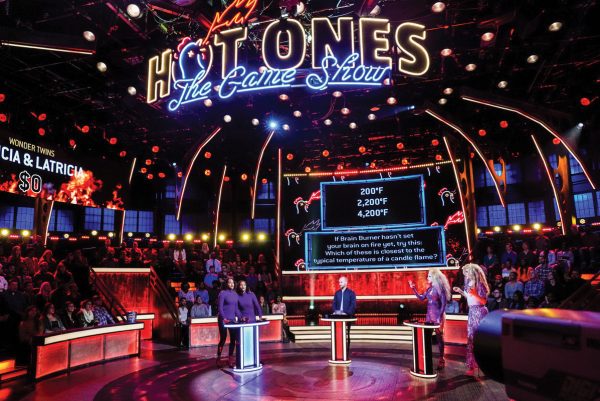
A college professor you had at the University of Illinois suggested that you become a weatherman. Is that really good career advice?
Sean: So I think the reason he was saying that is, my last year at U of I all the broadcast journalism students had to put on a live broadcast. So one week you would be an anchor. The next week you’d be the sports guy. Maybe you’d be a cameraman one week. So you’d rotate roles every week and end up working in this whole production. And the thing that no one could do was the weather, because it’s very difficult. If you have no broadcast experience, you’re off prompter, it’s like a three-minute feed, you’re working off of monitors, you’re looking at monitors left, right but otherwise you’re in front of a green screen and everything is opposite of your instincts. So people just throw to weather and even if you’re a good student journalist or whatever, people would freeze in weather. Everybody would be like that “boom goes the dynamite” kid.
But I liked weather and I would, like, throw in little jokes. And I liked being off the green screen and liked to put in little gags in the graphics and stuff like that. And talk about a storm system spinning like my curveball in high school.
I did these little things, had fun with it and so my professor just saw me, I think, as a standout in that regard probably because everybody’s struggled with it so much and he was like, “You’re so glib you should be a weatherman.” And I’m not even sure that’s a compliment necessarily but I was like, “Okay. Cool.” Because if you just studied broadcast journalism in college you’re like, “All right, well, I dream that maybe I could work in TV or work in radio or whatever.” But no one just gives you that job. So I was like, “Well, my entry point could be weather.” And one of my heroes, David Letterman had the same thing. He started out as a weatherman. So all that stuff seemed like, “Okay. Cool. That seems like the career track.” And obviously I did some different things along the way but, I never dreamed that one day I’d have a chicken wing talk show.
The big, sweaty, screaming affair that a Chris Farley-Hot Ones would be, that would be what I’d use my mythical dark arts powers to bring to life.
Have you dreamt about what your alternate life as a weatherman might have looked like?
Sean: Yeah. Sometimes I think about it. Where would I be? Maybe I’d be in Central Illinois working at the ABC affiliate in Champaign-Urbana. I’d have worked that job now at this point almost 10 years and maybe that would be kind of nice to just to live sort of a small-town, campus life. Maybe that’d be nice. I’m in New York now and obviously things have taken a totally different turn but it’s like the opposite universe. I could have been that. And I think I would have been happy doing that.
You might not know this, but David Letterman, Stephen Colbert and Oprah have a secret club where they perform seances where they raise people from the dead so that they can interview them. When they invite you into this secret society, who are you going to bring back to life and what are you asking him?
Sean: I’d probably bring Chris Farley back to the table. And I’m not sure if I have anything that I’d want to get to necessarily but I just think he’s probably made to be on Hot Ones unlike anybody that’s ever lived in entertainment. And just the big, sweaty, screaming affair that a Chris Farley-Hot Ones would be, that would be what I’d use my mythical dark arts powers to bring to life.
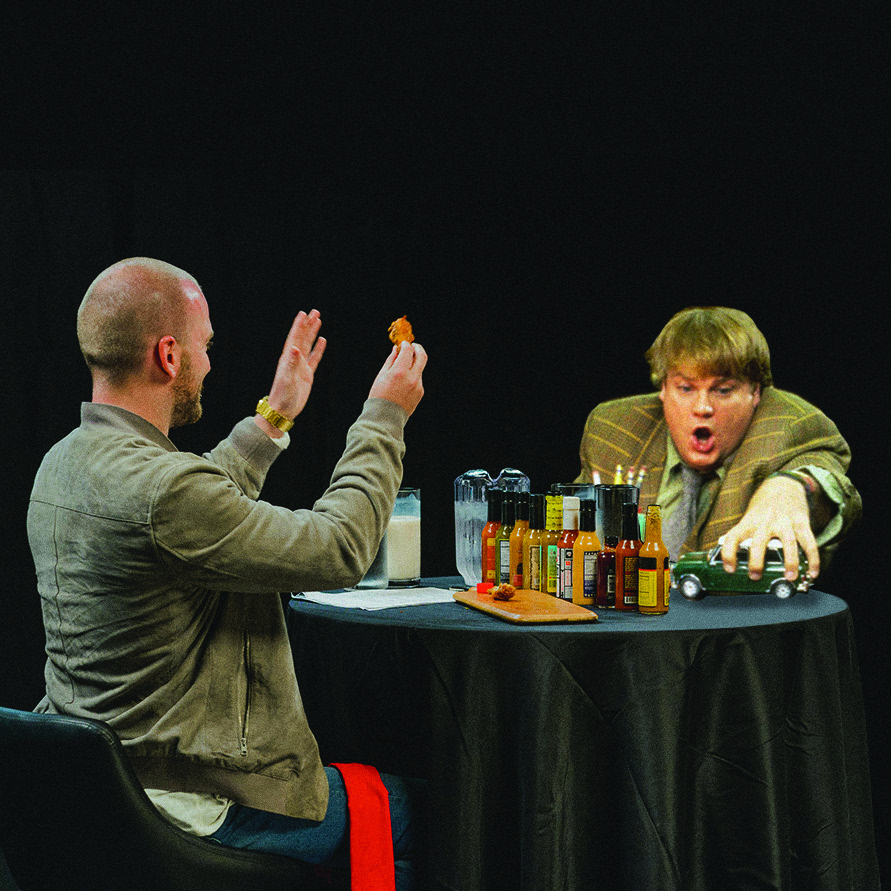
What’s it like doing the at-home version of the show right now that people are socially distanced?
Sean: There’s no replacing the sort of face-to-face human connection that you make in person, especially our show and with my style. That can’t be replaced or duplicated. So you lose that a little bit. The other side of it is the technology has been such a pain to figure out how to AirDrop this or Dropbox that, or this is a corrupted file or “what’s happening here” and “my QuickTime froze” or “we lost the connection” or a million things that go wrong and have ruined my day and taught me how much we take for granted when it comes to production. That’s the downside, the upside is right now I think most people are looking to escape this universal reality that we all are living through right now. And even if they can just get a taste of normalcy, I think that that’s important.
Right now it’s definitely tougher to make the show. And certainly, it’s not the same product as the in-studio version and I’m dying to get back to the studio but at the end of the day, a lot of people are going through some tough times right now. And some people really, really need Hot Ones. And so I think that’s what we are reminding ourselves of when we are going through frustrating times—this show’s important to some people and we need to make the show for the people that it’s important to. And you can see a sort of different level of appreciation in the comments or in the tweets that people send me that it really helps them on that Thursday. Whereas before maybe we’re the thing that you watched during your lunch break at work.
And when you do get back to the studio, if you can get walkout music—like a rally song that a relief pitcher would get when they run out of the bullpen—what would your walkout music be?
Sean: Well, I’ve thought about this. If I was a Major League closer, it would be Semisonic, “Closing Time.” I’ve always thought that. But I guess for a chicken wing talk show host, Nelly, “Hot in Here.”
What’s something that interviewing people while their faces are melting has taught you about life in general? Sean: It’s taught me that we’re all more the same than we are different. There’ve been so many different people from all walks of life that I’ve interviewed and they’ve all gone through this experience eating scorching-hot chicken wings and when it gets hot, they laugh or they get embarrassed maybe but laugh it off and I think that that’s the common bond. We all know what it’s like to die on hot sauce, so even if you bring in somebody who’s won Academy Awards or has a whole shelf full of Grammys, when it all comes down to it, we’re all humbled by hot sauce. And in that way I think we’re more the same than different.
What’s something you’d like everybody to know about hot sauce culture?
Sean: Over the years I was never a hot sauce person. I liked spicy food a little bit but I wasn’t that into it but being exposed to the subculture of hot sauce has been an amazing experience and getting to meet so many different growers and so many different makers. I really think that hot sauce—craft hot sauce—is kind of in the moment that craft beer had years ago where it just became this wave. Even down to the bottles like how people collect different beers because of the labels, same with hot sauce. I see so much artistry in the label. So many creatives, smart makers that are doing such amazing things.
I never understood the culture of hot sauce the way I do now. I think what’s interesting about it is you have so many different people. You can have classically trained chefs put out amazing hot sauce or you can have these pepper growers make amazing things out of peppers that they’ve engineered with their own wacky brains. And then you’d go to these hot sauce festivals and they look like Slayer concerts with all these guys with long hair and spiky bracelets and weird choker necklaces and stuff. It’s just such a unique mix of oddballs and interesting people. Or you know, people that won last year’s spicy wing eating competition. And then they’ve been training all year to defend their title but they have rivals that come in. The whole thing’s nuts.
The hot sauce subculture more or less has it figured out. I’m just humbled to be able to explore it. But if I were to talk to other people, I would just be like, “Look a little bit deeper into hot sauce.” So to the people who are afraid of it or don’t think they’ll like spicy food—it’s amazing what the right kind of hot sauce can do to elevate whatever you’re eating. I would encourage everybody to give it a try, see what you like, see what you don’t and be involved in it a little bit more. It’s been an amazing field trip for me and an amazing experience to just observe from the outside.
Sad news, Sean. One of the things that we found out in preparing this issue is that the restaurant Dante’s Inferno in Dumb and Dumber, where Lloyd and Harry accidentally killed the guy by putting hot peppers on his burger, is not a real place, which we were upset about because we wanted to profile it in the issue. Sadly, it was not to be. But if you could name a bar or a restaurant that served the hottest food on the planet, what would you call it?
Sean: Flaming Sean’s.
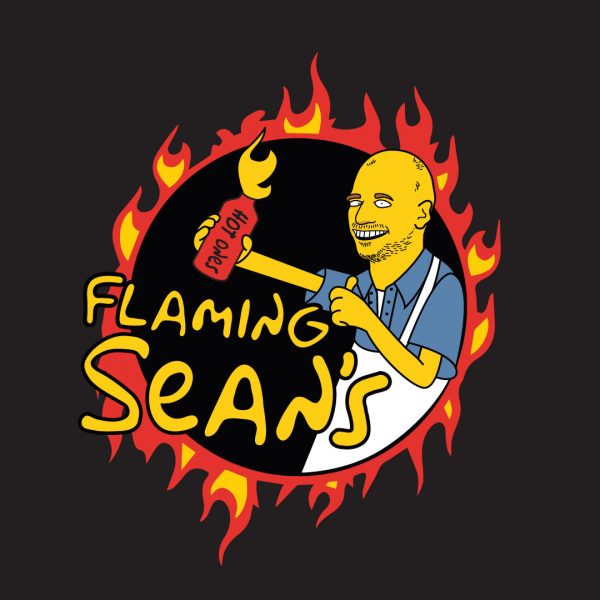
Are they going to serve a variation on the Flaming Moe cocktail from the Simpsons?
Sean: Yeah, exactly. Yeah. It’s going to be a Bloody Mary that we set on fire.
And hopefully, a long, long time from now, when the big spirit in the sky taps you on the shoulder and says, “It’s time Sean. We’re going up to interview Chris Farley,” and you think back about your career and your life, what do you think is going to be the most memorable experience that you had just because of hot sauce?
Sean: Well, this started out as just kind of a dumb idea between myself and Chris Schonberger and it’s not like we had any aspiration for it, but it was just the two of us kind of sitting in a room with a dumb idea and then we went for it and fully committed to it. And I think the most amazing thing is now when you look around at a staff meeting or something for First We Feast, you see 18, 19, 20 people in the room, you know?
I think that that’s what the amazing you can do is—just have this idea and start to move it forward. And then you build out the production and then you build out the staff. And then all of a sudden you just have people around you that you love who are committed to what they do, who are awesome at what they do and it creates just a much better quality of life because of a dumb idea. And I think that that’s kind of life in a way. There are all these opportunities. You can’t control those opportunities but sometimes you get them and when you commit to them in the right way and at the right time and get some luck and take advantage of some opportunities, then amazing things can happen.
And hopefully, someday I’ll look back and remember when it was 20 people in the team meetings, and maybe it’ll be 50 one day or 60 or a 100 then. The ability to just build a movement behind a dumb idea is proof positive that anything’s possible. And I think that Hot Ones is a very good example of that.
